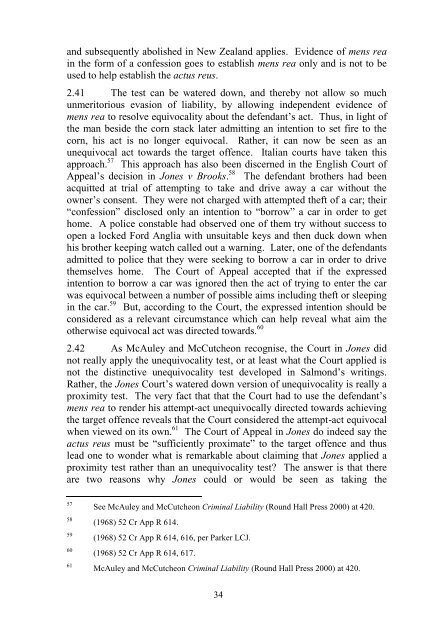Consultation Paper on Inchoate Offences - Law Reform Commission
Consultation Paper on Inchoate Offences - Law Reform Commission
Consultation Paper on Inchoate Offences - Law Reform Commission
You also want an ePaper? Increase the reach of your titles
YUMPU automatically turns print PDFs into web optimized ePapers that Google loves.
and subsequently abolished in New Zealand applies. Evidence of mens reain the form of a c<strong>on</strong>fessi<strong>on</strong> goes to establish mens rea <strong>on</strong>ly and is not to beused to help establish the actus reus.2.41 The test can be watered down, and thereby not allow so muchunmeritorious evasi<strong>on</strong> of liability, by allowing independent evidence ofmens rea to resolve equivocality about the defendant‟s act. Thus, in light ofthe man beside the corn stack later admitting an intenti<strong>on</strong> to set fire to thecorn, his act is no l<strong>on</strong>ger equivocal. Rather, it can now be seen as anunequivocal act towards the target offence. Italian courts have taken thisapproach. 57 This approach has also been discerned in the English Court ofAppeal‟s decisi<strong>on</strong> in J<strong>on</strong>es v Brooks. 58 The defendant brothers had beenacquitted at trial of attempting to take and drive away a car without theowner‟s c<strong>on</strong>sent. They were not charged with attempted theft of a car; their“c<strong>on</strong>fessi<strong>on</strong>” disclosed <strong>on</strong>ly an intenti<strong>on</strong> to “borrow” a car in order to gethome. A police c<strong>on</strong>stable had observed <strong>on</strong>e of them try without success toopen a locked Ford Anglia with unsuitable keys and then duck down whenhis brother keeping watch called out a warning. Later, <strong>on</strong>e of the defendantsadmitted to police that they were seeking to borrow a car in order to drivethemselves home. The Court of Appeal accepted that if the expressedintenti<strong>on</strong> to borrow a car was ignored then the act of trying to enter the carwas equivocal between a number of possible aims including theft or sleepingin the car. 59 But, according to the Court, the expressed intenti<strong>on</strong> should bec<strong>on</strong>sidered as a relevant circumstance which can help reveal what aim theotherwise equivocal act was directed towards. 602.42 As McAuley and McCutche<strong>on</strong> recognise, the Court in J<strong>on</strong>es didnot really apply the unequivocality test, or at least what the Court applied isnot the distinctive unequivocality test developed in Salm<strong>on</strong>d‟s writings.Rather, the J<strong>on</strong>es Court‟s watered down versi<strong>on</strong> of unequivocality is really aproximity test. The very fact that that the Court had to use the defendant‟smens rea to render his attempt-act unequivocally directed towards achievingthe target offence reveals that the Court c<strong>on</strong>sidered the attempt-act equivocalwhen viewed <strong>on</strong> its own. 61 The Court of Appeal in J<strong>on</strong>es do indeed say theactus reus must be “sufficiently proximate” to the target offence and thuslead <strong>on</strong>e to w<strong>on</strong>der what is remarkable about claiming that J<strong>on</strong>es applied aproximity test rather than an unequivocality test? The answer is that thereare two reas<strong>on</strong>s why J<strong>on</strong>es could or would be seen as taking the5758596061See McAuley and McCutche<strong>on</strong> Criminal Liability (Round Hall Press 2000) at 420.(1968) 52 Cr App R 614.(1968) 52 Cr App R 614, 616, per Parker LCJ.(1968) 52 Cr App R 614, 617.McAuley and McCutche<strong>on</strong> Criminal Liability (Round Hall Press 2000) at 420.34
















